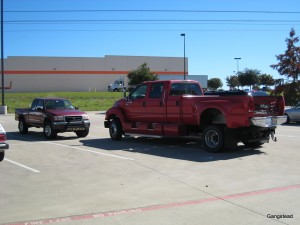The highest insurance deductible is not the way to go.

I recently had to get a car that can accept car seats and had the accompanying excitement of getting new insurance.
There are all sorts of options in there and some are mandatory. The place where I feel I have the most control over my destiny is the comprehensive and collision. With all of the liability options you are required to get a certain level and your assets you don’t want to lose in a law suit help you determine how much liability protection you want to purchase. Collision and comprehensive are entirely up to you. You don’t even need to buy them if you don’t have a loan. The question is how much do you want to pay now vs how much do you want to pay later if you make a claim. Like most decisions in life I made a spread sheet for it.
Conventional wisdom is that the higher you put your deductible the lower your premium and the more you save. If you factor in the deductible cost when you make a claim the lower premium might not be worth it depending on how long you go between accidents. It all sounds reasonable but it’s not useful until you put some numbers down.
For the new dad-mobile I went online to get insurance. It would be great if they would just tell you the cost for each deductible at once, but life isn’t so easy and I had to click through the menu a bunch of times to get the following prices for the available deductible ranges for “comprehensive” coverage. This covers non-collision things like hail, deer, burglary etc.
Comprehensive:
| Deductible | 6-month premium |
| 0 | 65.33 |
| 50 | 57.52 |
| 100 | 52.79 |
| 200 | 46.20 |
| 250 | 43.54 |
| 500 | 34.06 |
| 1000 | 27.17 |
Your total cost for a time frame is going to be the deductible plus the premiums paid for that time. So if you go 5 years then pay a $500 deductible you will have paid 2*$34.06 for 5 years plus $500. To make the graph easier to read I then divide by the number of years (otherwise you get a bunch of straight lines with slightly different slopes). In pretty chart form it looks like this:
Some interesting notes:
- Your cheapest option for a time frame is the lowest line for that year. You may be better off paying a higher premium for the lower deductible.
- This is only useful if you admit that you will make a claim sometime.
- My insurance company offers some guidance: 65% of their members choose $500 comprehensive deductible.
- The $500 deductible isn’t the cheapest option unless you go at least 13 years without making a claim, few people keep their cars that long.
- The $1000 deductible isn’t the cheapest option until 40 years out. That long of a time frame is hardly even relevant because your vehicle is either a $0 junker or $$$$$ collector’s item by that time.
- This is only good till the first accident. Your premium will probably change after a claim. So don’t make an assumption that if you make a claim every year that $0 deductible is the way to go.
- Your premium also changes when you don’t make a claim, but more gradually.
- The value of your car changes over time, so if you are in the large time between claims camp it may change whether you decide to cover it at all.
I’ve been driving for 11 years now so I think I have a big enough sample to make a good decision. I have made 2 non-collision claims in that time. I had hail damage in 2003 and was burgled in 2010. Both were freak occurrences and not predictable. I had raised my deductible to the maximum $1000 to save money. Unfortunately this was just before the 2010 burglary.
For the new car I chose $200 deductible which means I place my self at the 7-10 year range for another claim. The numbers for collision were much different and I chose $500. Changing the numbers relative to each other by just a few dollars drastically shift which option is the cheapest for a given time frame.
The numbers were surprising, I went in thinking that the longer you go without accidents the highest deductible would always be the cheapest overall. This is sort of true, but not on the scale of car ownership.
Do you think that most people choose the $500 deductible because
- They over estimate how long they will go without making a claim or
- They didn’t take the time to get a bunch of quotes and crunch the numbers?
Steven Gangstead
